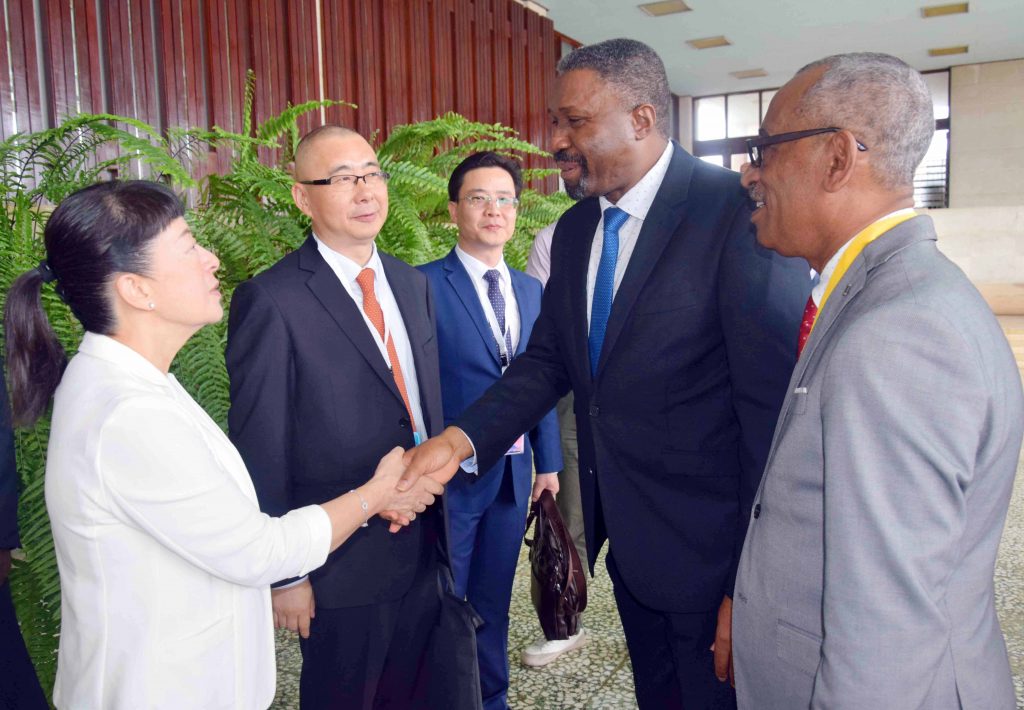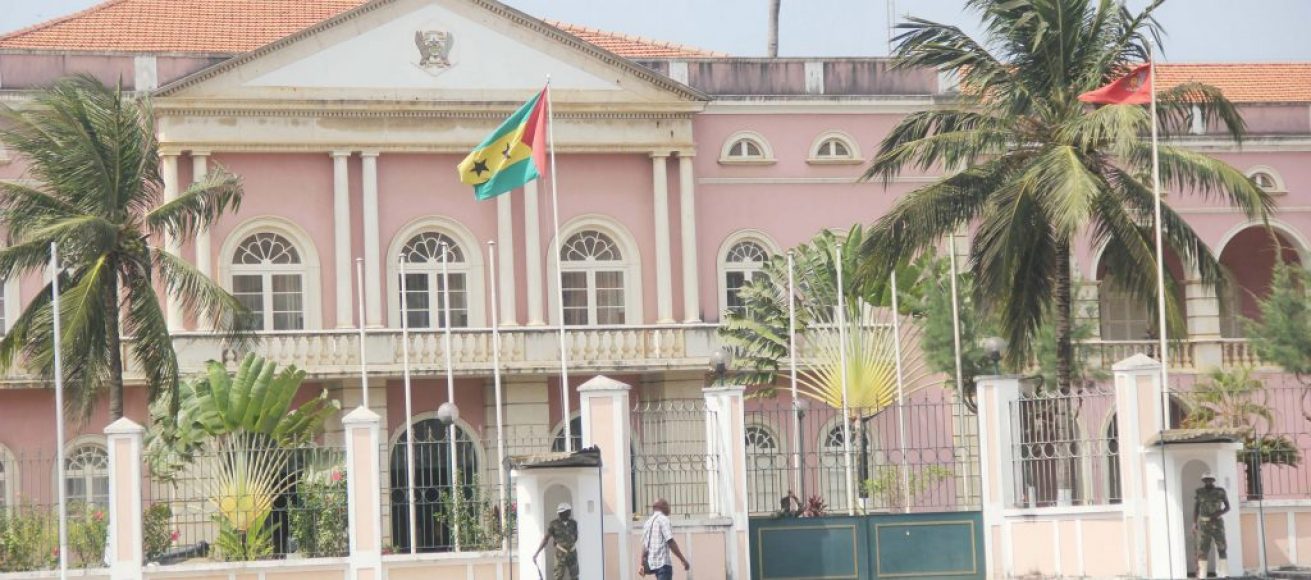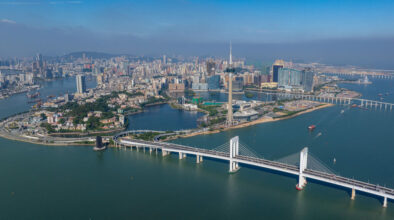Dance, music and multiple potential investments – the 14th Entrepreneurs Meeting for Economic and Trade Co-operation between China and Portuguese-speaking Countries in São Tomé and Príncipe saw the African nation open itself up to a bright new future.
Singing and dancing is an important part of São Tomé and Príncipe’s culture. The pretty African island nation, which sits in the Gulf of Guinea, off the coast of Gabon, has a long history of musically inspiring performances that tell stories and move audiences. However, singing in Chinese is hardly an everyday occurrence.
It is a unique experience then when a group of two dozen teenagers break into traditional Chinese songs on 10 July, at the official inauguration of São Tomé’s Confucius Institute – just hours after the two-day 14th Entrepreneurs Meeting for Economic and Trade Cooperation between China and Portuguese-speaking Countries has ended. An audience – which includes the nation’s Prime Minister, Jorge Bom Jesus, as well as Chinese ambassador, Wang Wei – stands mesmerised by the young vocalists before they witness performances by Chinese singers and martial arts groups, as well as a rendition of Hubei province’s Dance of the Lions.
Unique it may be to see this performance, however it may not be an out-of-place sight for long as relations between São Tomé and Príncipe – which gained independence in 1975 – strengthen. In fact, these performances highlight how important the links that are being forged between the island nation and China are becoming, particularly since December 2016, when diplomatic relations were re-established between the two after almost 20 years following the archipelago’s decision to sever diplomatic ties with Taiwan.
The teenagers form the first class of locals who are learning the Chinese language at the Confucius Institute. They have been studying since April and another class is to start in the next few months. It serves as a great parallel to the fortunes of the country as a whole – from some tough times and uncertainty, a new dawn with exciting new opportunities may just be beginning.
Investment is key
The Republic of São Tomé and Príncipe – the smallest Portuguese-speaking country in the world – has experienced plenty of uncertainties over past decades, including political and economic problems. The nation, which has a population of around 200,000 people spread across 1,001 square kilometres, was labelled as having a ‘fragile economy’ by The World Bank earlier this year. It said the developing island state was ‘highly vulnerable to exogenous shocks’. All this has meant that attracting foreign investment has become vital.
Agriculture and tourism are hugely important to the nation’s economy – and that includes the production of cocoa and, thus, chocolate. In the early 1900s, the ‘Chocolate Islands’ were the biggest producer of the sweet stuff in the world and there’s still a huge focus on the industry today. So, the chance for foreign private bodies to invest in the industry, as well as other sectors like tourism, is at the heart of the Entrepreneurs Meeting. The government and the São Tomé Trade and Investment Promotion Agency (APCI) have been giving the two-day event on 8 and 9 July the utmost priority.
Not only is it the first time the event has been held in the nation – the second-poorest per capita in the Portuguese-speaking world after Guinea-Bissau – but for many of the entrepreneurs and delegations from China and Portuguese-speaking countries, it is their first proper look at the country. For Bom Jesus – who is extremely keen on bringing in foreign investment, particularly from China – and his newly elected, reform-minded government, it is also the first time they can show off their country’s vast potential to potential future investors.
More than 300 people, including up to 150 potential investors, attend. At the opening, in the National Assembly building, Bom Jesus tells the delegations of attendees to ‘feel at home’ in the nation – but the investors are also challenged to look beyond ‘the world’s best chocolate’. The islands, according to the Prime Minister, should be seen as a gateway to the Gulf of Guinea sub-region at a time when ‘new pages are [being] written on the relaunch and boosting of the historical and brotherly relations between the countries and peoples of São Tomé, China and Africa’ in a ‘multilateral perspective of mutual respect’.
We want to improve the infrastructure of this country and have better connections with the outside world. It is one of São Tomé and Príncipe’s dreams.
Ambassador Wang
Bom Jesus also notes in his address that investors should look to the human capital of the islands – a young population ‘thirsty for training’ as a way to cut ‘the vicious cycle of poverty and underdevelopment’. He highlights that sectors like telecoms, trading, tourism, oil, education and health are all worthy of investment.
The agreements
Not long after the Prime Minister takes to the stage, the first six bilateral agreements are signed. APCI director Rafael Branco – in his role for only a few months – and president of the Macao Trade and Investment Promotion Institute (IPIM), Irene Va Kuan Lau, sign a cooperation agreement. The Portuguese-Speaking Countries Business Forum (FELP), headed by Maria João Gregório, also signs a framework agreement with the São Tomé e Príncipe Chamber of Commerce and Industry. In the legal sector, the Alliance of Legal Services for the Interior of the People´s Republic of China, Macau and the Portuguese Speaking Countries sign an agreement with São Tomé and Príncipe law firm OADL & Associados. There’s an air of positive change already.
Lao Kam Chio, general manager of Macau Plops Investment and Promotion, signs an agreement with Mozambique’s Ministry of Health. Established in Macao over a year ago by investors from Guangzhou, Macao and Hong Kong, Plops is installing water purification systems in Portuguese-speaking countries, mostly for the health industry, according to Lao.
Under the new agreement, two new systems will be donated to hospitals in Mozambique’s capital, Maputo, serving around 2,000 people. So far, the company has made donations to Cabo Verde, Guinea-Bissau and – more recently – São Tomé and Príncipe. Lao adds that the company will service the donated equipment. Lao also signs an agreement with African bank BGFI, with the aim of supporting the bank´s establishment in Asia – namely for facilitating the import of Chinese goods in Central African countries. In Portugal, Plops is involved in food trading and with bringing Portuguese goods into Macao.
Business opportunities
Other business leaders and entrepreneurs are in São Tomé looking for opportunities – and many are quick to find them. One such person is Rita Santos, former deputy secretary-general of the Macao Forum, who negotiates with local chocolate producers Diogo Vaz. The businesswoman says that a recent agreement she signed in Macao with the Zhuhai High-Speed Railway Company foresees the creation in every station of a ‘Portuguese-speaking countries products corner’ – and Diogo Vaz chocolate has what it takes to feature as a delicacy from São Tomé and Príncipe.

“I hope to close this deal by lunch-time,” she says at the event’s fair of local products. São Tomé and Príncipe ‘is virgin, new’, so now ‘is the time to start’, she adds. “When it becomes a developed country,” she says, “it will be harder to penetrate. In the beginning, it’s not easy, but with persistence I think you can get there. For Macao’s SMEs, I think it is better to start with import and export and – as they become aware of investment opportunities and the local market – they will know more people.”
Foreign investors have a strong desire to cooperate with local businesses and to help the people of São Tomé to rise from poverty and have a better life.
Ambassador Wang
Other entrepreneurs are sniffing for coffee, like Jessica and Simon Tong of Macao-based Seng Pan Food Company, which has been in the coffee industry for more than 30 years. It’s Simon Tong’s first time in São Tomé and he is impressed with the local coffee. “It’s good quality,” he says. “If they want it to be excellent quality, they have to import the processing, the selecting and the sorting, to choose the best beans and improve the plantations. We can give them instructions and improvements because we have a huge network in the coffee industry.”
Living in São Tomé for over a decade, Wang Zhanbo, secretary of the local Chinese Businessmen Association, says visas are now easier to obtain and Chinese interest and investment is growing. But the economy has slowed and there are still barriers for investors. “Infrastructure still limits investment and travel,” he says. Currently the owner of a service-providing company for tourists and business delegations, Wang says trading is the main activity for Chinese people living in São Tomé. According to him, since diplomatic relations between both countries were re-established, the number of Chinese living in the islands has doubled to around 200 people.
Connecting to the world
Most of the infrastructure in São Tomé dates back to the pre-independence period. This is now widely considered to be one of its main constraints to growth. The country dreams of becoming a regional trading platform, with a state-of-the-art deep-water port, but has fallen behind other countries in the region, which were quicker to develop such infrastructure.
With the support of China, the first infrastructure projects have been launched over the past two years, according to Wang Wei. The priority has been the rehabilitation of three roads, along with the draining of a swamp close do the capital. All were donations from China, the diplomat says.
Next will be the construction of social housing – and work on the modernisation and enlargement of São Tomé’s airport is expected to begin over the next few months. “We are studying how we can help execute this work as quickly as possible,” says Wang Wei, “to improve the infrastructure of this country and have better connections with the outside world. It will practically be one of the most important projects in this country since independence. This, too, is one of São Tomé’s dreams.”
More – and more improved – air connections should facilitate tourism, as well as making it more attractive and accessible for business delegations. Wang Wei observes that foreign investors have ‘a strong desire to cooperate with local businesses and to help the people of São Tomé to rise from poverty and have a better life’. “They had the first contact [at the Entrepreneurs Meeting],” he says, “which is essential. Contact is a precondition for finding opportunities for cooperation.”
During the two-day event, more than 80 business meetings between Chinese and local businessmen are organised by IPIM and APCI, with dozens of investment projects being presented. On the sidelines, São Tomé politician Carlos Tiny mentions that the São Tomé and Príncipe-China Chamber of Commerce will be launched soon. “In addition to state-to-state relations,” he says, “the private sector interested in cooperation with China – and especially in the framework of the Belt and Road Initiative – can and should be structured to also foster this relationship.”
Tiny is particularly excited about the Belt and Road Initiative – which is a global development strategy by the Chinese government involving infrastructure development and investment across the world, including Africa – and laments that most people in São Tomé do not know about it yet ‘because there have been no bilateral diplomatic relations over the last 20 years’.
A bright future
In an interview with Macao Magazine, Jorge Bom Jesus says that China and Angola are now his country´s two ‘most dynamic’ economic partners. Not only is China supporting the nation with a donation of 200 million yuan – about US$30 million or almost MOP230 million – but it’s also pushing forward with the major infrastructure projects. The plans for the airport are ‘already quite advanced’, says the Prime Minister, with construction beginning ‘by the end of the year or early next year’.
As for the nation’s port, the government is discussing financing projects with the public and private sectors. “There is also [an] openness [to financing] by private funds,” says Bom Jesus, “backed by China, Chinese banks and credit lines. Other than that, we are open and we have been persuading investors in the areas of energy, roads, telecommunications and housing.”
The Prime Minister notes that the government also wants to extend cooperation to the rehabilitation of the city of São Tomé, which dates back to the 15th century, ‘to make it available to tourists and posterity’. And, according to the head of the government, another hotspot could be a recently reactivated project to create an offshore free trading zone. And then there’s the gaming industry. Former Prime Minister Rafael Branco says the APCI investment agency has already been receiving projects for the offshore zone, which should include gaming. He says he wants to ‘identify sizeable players to launch’ the gaming industry in the archipelago.
All in all, the whole event in early July was ‘very positive’, says Branco, adding that the investors did not leave ‘blank’ as they learned about São Tomé and Príncipe’s ‘environment, regulations and potential’. He also says there are up to a dozen potential projects now on the table as a result of the event which could become a reality.
Rodrigo Brum, Forum Macao’s deputy secretary-general, agrees. “I would say this is a first step – the first event for a country that became a member [of Forum Macao] only two years ago”, he sums up. “Opportunities were pointed out, presentations were made and businessmen became aware. No doubt there will be repercussions.”
Prime Minister’s questions
Jorge Bom Jesus answers a few of our queries
You say investment is a priority to relaunch São Tomé and Príncipe’s economy. But that will involve improving the business environment…
Yes, easing some legislation in terms of access to credit and private property… there is a lot we have to work on because we have a very low [business environment] ranking in many cases. We really need to improve legislation to attract investors. They will come not because of beautiful eyes or for the beauty of the country – but in a win-win perspective. If they settle, the state can collect taxes to invest in education, health and social protection.
Will oil be an investment hotspot in the foreseeable future?
In oil exploration, in our exclusive zone, there are prospects for one of the companies to make a first drilling next year – and hopefully it will be successful. There are big companies that are present – BP, Kosmos, Total, Galp, some Nigerian companies… We will see. We are praying that everything will work out but we know that oil dividends have to be applied in other areas – agriculture, infrastructure – because oil is an exhaustible resource and hence we are also working to enhance it in other ways.
And will security be a focus?
We will continue to focus on security as well. São Tomé is already a country that has peace in its DNA but we must work on political stability, on the security of people and goods. In fact, if we have a peaceful country – and hospitality as a hallmark – we must continue to educate and raise awareness of hospitable behaviour because tourism is truly cross-cutting. Everyone can win.
What about the gaming industry?
You know, investments pull for each other. From the moment you have resorts and major hotel chains, of course gaming will appear. There is already an embryo in Hotel Pestana – not very developed but I believe that this will all be part of these investments around tourism.
In terms of gaming, what about collaborations with Macao?
Of course, Macao is a reference in this area. We will bring here the best practices of each country and indeed for Macao in the area of gaming. We are even willing to send delegations there for training.
Are you planning to go to Macao soon?
There are prospects. I’m told that next year there will be a ministerial meeting at Forum Macao and that I will be invited…



